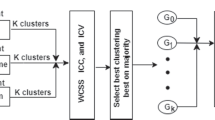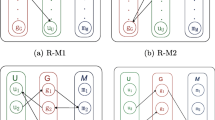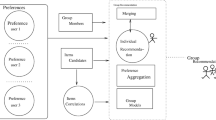Abstract
Recommender systems provide personalized suggestions to users regarding products and services. These recommendations are generated for individual users only. However, group activities are gaining popularity in several applications such as movie recommendations, e-tourist, etc. There is a need for a group recommendation system that helps people to provide better recommendations for group members instead of a single user. Most of the works in group recommendation systems use two approaches as group aggregate prediction and group aggregate model. Group aggregate prediction performs based on the group individual prediction information. The group aggregate model is determined by aggregating individual user preferences. Accurate prediction for a group using the choices of other group members is a challenging task, and this prediction task was performed using a static approach. In this work, we propose group recommendations using Slope One for generating group recommendations. Slope One is capable of producing relevant results in a shorter time and is efficient at query time; one of the advantages is to support the dynamic updates of the rating predictions in online mode. Also, a novel modelling technique (Max after threshold) is introduced. It adopts an aggregate prediction feature to provide better recommendations to the group by using Slope One. The experiments are done on two benchmark datasets. The proposed technique outperforms the state-of-the-art group recommendation models.







Similar content being viewed by others
Data availability
In our experiment the datasets used from MovieLens and Netflix: (https://grouplens.org/datasets/movielens/1M/). (http://www.netflix.com/).
References
Jesús B, Fernando O, Antonio H, Abraham Gutiérrez (2013) Recommender systems survey. Knowl Based Syst 46:109–132. https://doi.org/10.1016/j.knosys.2013.03.012
Cacheda F, Carneiro V, Fernández D, Formoso V (2011) Comparison of collaborative filtering algorithms: Limitations of current techniques and proposals for scalable, high-performance recommender systems. ACM Trans Web (TWEB) 5(1):1–33. https://doi.org/10.1145/1921591.1921593
Shardanand U, Maes P (1995) Social information filtering: algorithms for automating" word of mouth." In: Proceedings of the SIGCHI conference on Human factors in computing systems. pp. 210–217. https://doi.org/10.1145/223904.223931
Herlocker Jonathan L, Konstan Joseph A, Terveen Loren G, Riedl John T (2004) Evaluating collaborative filtering recommender systems. ACM Trans Inf Syst (TOIS) 1:5–53
Gediminas A, Alexander Tuzhilin (2005) Toward the next generation of recommender systems: A survey of the state-of-the-art and possible extensions. IEEE Trans Knowl Data Eng 17:6734–749
Xueming Q, He F, Guoshuai Z, Tao Mei (2013) Personalized recommendation combining user interest and social circle. IEEE Trans knowl Data Eng 26(7):1763–1777
Jiajun B, Shen Xin X, Bin CC, Xiaofei H, Deng Cai (2016) Improving collaborative recommendation via user-item subgroups. IEEE Trans Knowl Data Eng 28:92363–2375
Weiqing W, Yin Hongzhi D, Xingzhong NQ, Hung V, Xiaofang Z (2018) A temporal personalized model for spatial item recommendation. ACM Transactions on Intelligent Systems and Technology (TIST). 9:1–25. https://doi.org/10.1145/3230706
Wang C, Blei MD (2011) Collaborative topic modeling for recommending scientific articles, In: Proceedings of the 17th ACM SIGKDD international conference on Knowledge discovery and data mining, ACM, pp. 448–456
McCarthy JF, Anagnost TD (1998) MUSICFX: An arbiter of group preferences, In: AAAI Spring Symposium on Intelligent Environments, pp. 1-7
Cao D, He X, Miao L, An Y, Yang C, Hong R(2018) Attentive group recommendation, In: The 41st International ACM SIGIR Conference on Research & Development in Information Retrieval, ACM, pp. 645–654. https://doi.org/10.1145/3209978.3209998
Hu L, Cao J, Xu G, Cao L, Gu Z, Cao W(2014) Deep modeling of group preferences for group-based recommendation, In: Twenty-Eighth AAAI Conference on Artificial Intelligence
Said A, Berkovsky S, De Luca EW (2011) Group recommendation in context, In: Proceedings of the 2nd challenge on context-aware movie recommendation, ACM, pp. 1–3. https://doi.org/10.1145/2096112.2096113
Judith Masthoff (2015) Group recommender systems: aggregation, satisfaction and group attributes, recommender systems handbook. Springer, Boston, MA, pp 743–776
Lieberman H, Van Dyke NW, Vivacqua AS (1999) Let’s browse: a collaborative Web browsing agent. In: Proceedings of the 4th international conference on Intelligent user interfaces pp. 65–68. https://doi.org/10.1145/291080.291092
O’connor M, Cosley D, Konstan JA, Riedl J(2001) PolyLens: a recommender system for groups of users. In: ECSCW2001. Springer, Dordrecht, pp 199–218
Liliana A, Anna G, Giovanna P, Marino S, Pietro Torasso (2003) Intrigue: personalized recommendation of tourist attractions for desktop and hand held devices. Appl Artif Intell 17(8–9):687–714. https://doi.org/10.1080/713827254
McCarthy JF (2002) Pocket restaurantfinder: A situated recommender system for groups, In: Workshop on Mobile Ad-Hoc Communication at the 2002 ACM Conference on Human Factors in Computer Systems, pp. 1-7
Berkovsky S, Freyne J (2010) Group-based recipe recommendations: analysis of data aggregation strategies, In: Proceedings of the fourth ACM conference on Recommender systems, pp. 111–118. https://doi.org/10.1145/1864708.1864732
Christensen Ingrid A, Silvia Schiaffino (2011) Entertainment recommender systems for group of users. Expert Syst Appl 38(11):14127–14135. https://doi.org/10.1016/j.eswa.2011.04.221
Quijano-Sánchez L, Díaz-Agudo B, Recio-García JA (2014) Development of a group recommender application in a social network. Knowl Based Syst 71:72–85. https://doi.org/10.1016/j.knosys.2014.05.013
Boratto L, Carta S, Fennu G (2016) Discovery and representation of the preferences of automatically detected groups: exploiting the link between group modeling and clustering. Future Gener Comput Syst 64:165–174. https://doi.org/10.1016/j.future.2015.10.007
Kaššák O, Kompan M, Bieliková M, Personalized hybrid recommendation for group of users: Top-N multimedia recommender. Inf Process Manag, 52:3 pp. 459–477. https://doi.org/10.1016/j.ipm.2015.10.001
Khoshkangini R, Pini Maria S, Rossi F (2016) A self-adaptive context-aware group recommender system, In: Conference of the Italian Association for Artificial Intelligence, Springer, pp. 250–265
Agarwal A, Chakraborty M, Chowdary CR (2017) Does order matter? effect of order in group recommendation. Expert Syst Appl 82:115–127. https://doi.org/10.1016/j.eswa.2017.03.069
McCarthy K, Salamó M, Coyle L, McGinty L, Smyth B, Nixon P (2006) Cats: A synchronous approach to collaborative group recommendation, In: Florida Artificial Intelligence Research Society Conference (FLAIRS), pp. 86–91
Crossen A, Budzik J, Hammond K (2002) Flytrap: intelligent group music recommendation, In: Proceedings of the 7th international conference on Intelligent user interfaces, pp. 184–185. https://doi.org/10.1145/502716.502748
Chao DL, Balthrop J, Forrest S (2005) Adaptive radio: achieving consensus using negative preferences, In: Proceedings of the 2005 international ACM SIGGROUP conference on Supporting group work, pp. 120–123. https://doi.org/10.1145/1099203.1099224
Márquez Álvarez JO, Ziegler J (2015) Preference elicitation and negotiation in a group recommender system, In: IFIP Conference on Human-Computer Interaction, Springer, pp. 20–37
Liu Y, Wang B, Wu B, Zeng X, Shi J, Zhang Y (2016) International Conference of Pioneering Computer Scientists. Springer, Engineers and Educators, pp 258–271
Fernando Ortega, Antonio Hernando, Jesus Bobadilla, Hyung Kang Jeon (2016) Recommending items to group of users using matrix factorization based collaborative filtering. Inf Sci 345:313–324. https://doi.org/10.1016/j.ins.2016.01.083
Gugulothu N, TV V, Malhotra P, Vig L, Agarwal P, Shroff G (2017) Predicting remaining useful life using time series embeddings based on recurrent neural networks, arXiv preprint arXiv:1709.01073pp. 1-10
Seo YD, Kim YG, Lee E, Seol KS, Baik DK (2018) An enhanced aggregation method considering deviations for a group recommendation. Expert Syst Appl 39:299–312. https://doi.org/10.1016/j.eswa.2017.10.027
Delic A, Neidhardt J, Nguyen TN, Francesco Ricci (2018) An observational user study for group recommender systems in the tourism domain. Inf Technol Tour 19(1):87–116
Wang X, Liu Y, Lu J, Xiong F, Zhang G (2019) TruGRC: trust-aware group recommendation with virtual coordinators. Future Gener Comput Syst 94:224–236. https://doi.org/10.1016/j.future.2018.11.030
Nozari RB, Hamidreza Koohi (2020) A novel group recommender system based on members’ influence and leader impact. Knowl Based Syst 205:1–12. https://doi.org/10.1016/j.knosys.2020.106296
Seo YD, Kim YG, Lee E, Kim H (2021) Group recommender system based on genre preference focusing on reducing the clustering cost. Expert Syst Appl 183:115396. https://doi.org/10.1016/j.eswa.2021.115396
Ismailoglu F (2021) Aggregating user preferences in group recommender systems: a crowdsourcing approach. Decis Support Syst 152:113663. https://doi.org/10.1016/j.dss.2021.113663
Quijano-Sánchez L, Recio-García JA, Díaz-Agudo B, Jiménez-Díaz G (2011) Happy movie: A group recommender application in facebook, In: Twenty-Fourth International FLAIRS Conference. pp. 1-2
Baltrunas L, Makcinskas T, Ricci F (2010) Group recommendations with rank aggregation and collaborative filtering, i n: Proceedings of the fourth ACM conference on Recommender systems, pp. 119–126. https://doi.org/10.1145/1864708.1864733
Khazaei E, Alimohammadi A (2018) An automatic user grouping model for a group recommender system in location-based social networks. ISPRS Int J Geo Inf 7(2):67
Cantador I, Castells P (2011) Extracting multilayered Communities of Interest from semantic user profiles: application to group modeling and hybrid recommendations. Comput Human Behav 24(4):1321–1336. https://doi.org/10.1016/j.chb.2010.07.027
Boratto L, Carta S(2014) Modeling the preferences of a group of users detected by clustering: A group recommendation case-study, In: Proceedings of the 4th international conference on web intelligence, mining and semantics (WIMS14), pp. 1–7. https://doi.org/10.1145/2611040.2611073
MacQueen J, (1967) Some methods for classification and analysis of multivariate observations, In: Proceedings of the fifth Berkeley symposium on mathematical statistics and probability, pp. 281–297
Kużelewska U (2011) Advantages of information granulation in clustering algorithms, In: International Conference on Agents and Artificial Intelligence, pp. 131–145
McSherry D (2004) Explaining the Pros and Cons of Conclusions in CBR, In: European Conference on Case-Based Reasoning, pp. 317–330
Kumar J, Ramanjaneyulu YV, Babu KS, Patra BK (2021) New Paradigms in Computational Modeling and Its Applications. Elsevier, Netherland, pp 209–239
Lemire D, Maclachlan A (2005) Slope one predictors for online rating-based collaborative filtering, In: Proceedings of the 2005 SIAM International Conference on Data Mining, SIAM, pp. 471–475
Boratto L, Carta S (2015) The rating prediction task in a group recommender system that automatically detects groups: architectures, algorithms, and performance evaluation. J Intell Inf Syst 45(2):221–245
Su X, Khoshgoftaar TM (2009) A survey of collaborative filtering techniques. Adv Artif Intell 2009:1–20
Desrosiers C, Karypis G (2011) A comprehensive survey of neighborhood-based recommendation methods. Recomm Syst Handbook, pp. 107-144
Patra BK, Launonen R, Ollikainen V, Nandi S (2015) A new similarity measure using Bhattacharyya coefficient for collaborative filtering in sparse data. Knowl Based Syst 82:163–177
Boratto L, Carta S, Satta M (2010) Groups Identification and Individual Recommendations in Group Recommendation Algorithms, In: PRSAT@ recsys, pp. 27–34
Chen YL, Cheng LC, Chuang CN (2008) A group recommendation system with consideration of interactions among group members. Expert Syst Appl 34:2082–2090. https://doi.org/10.1016/j.eswa.2007.02.008
Sun L, Liu X, Liu Y, Wang T, Guo L, Zheng X, Luo Y (2021) A novel deep recommend model based on rating matrix and item attributes. J Intell Inf Syst 57(2):1–25. https://doi.org/10.1007/s10844-021-00644-x
Jalali S, Hosseini M (2021) Collaborative filtering in dynamic networks based on deep auto-encoder. J Supercomput 78(5):1–18. https://doi.org/10.1007/s11227-021-04178-5
Masthoff J (2004) Group modeling: Selecting a sequence of television items to suit a group of viewers.Personalized digital television, Springer, pp. 93–141
Park J, Nam K (2019) Group recommender system for store product placement. Data Mining Knowl Discov 33(1):204–229
Gazdar A, Hidri L (2020) A new similarity measure for collaborative filtering based recommender systems. Knowl Based Syst 188:105058
Alhijawi B, Kilani Y (2020) A collaborative filtering recommender system using genetic algorithm. Inf Process Manag 57(6):102310
Walek B, Fojtik V (2020) A hybrid recommender system for recommending relevant movies using an expert system. Expert Syst Appl 158:113452. https://doi.org/10.1016/j.eswa.2020.113452
Shambour Q (2021) A deep learning based algorithm for multi-criteria recommender systems. Knowl Based Syst 211:106545. https://doi.org/10.1016/j.knosys.2020.106545
Song YT, Wu S (2020) Comparison of group recommendation algorithms. Procedia Computer Science, pp 539–545
Yalcin E, Ismailoglu BA (2021) An entropy empowered hybridized aggregation technique for group recommender systems. Expert Syst Appl 166:114111
Yalcin E, Bilge A (2021) Investigating and counteracting popularity bias in group recommendations. Inf Proces Manag 58(5):102608. https://doi.org/10.1016/j.ipm.2021.102608
Yalcin Emre, Bilge Alper (2021) Novel automatic group identification approaches for group recommendation, Expert Systems with Applications, Elsevier, pp. 1-19. https://doi.org/10.1016/j.eswa.2021.114709
Funding
No funding was received for this research work.
Author information
Authors and Affiliations
Corresponding author
Ethics declarations
Conflict of interest
The authors declare that they have no conflict of interest.
Additional information
Publisher's Note
Springer Nature remains neutral with regard to jurisdictional claims in published maps and institutional affiliations.
Rights and permissions
About this article
Cite this article
Yannam, V.R., Kumar, J., Babu, K.S. et al. Enhancing the accuracy of group recommendation using slope one. J Supercomput 79, 499–540 (2023). https://doi.org/10.1007/s11227-022-04664-4
Accepted:
Published:
Issue Date:
DOI: https://doi.org/10.1007/s11227-022-04664-4




